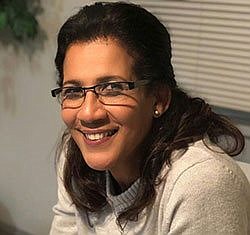Advocacy champion urges participation in Church
September 2, 2020 at 9:56 p.m.

As a commissioned lay ecclesial minister – a distinction she received from the Diocese of Trenton in 2007 – Acosta said encouraging people to return to regular participation in the Church “has been my concern since day one.”
Acosta earned a master’s degree in theology and a bachelor’s degree in sociology at Georgian Court University, Lakewood. She also holds a bachelor’s degree in forensic psychology earned from John Jay College of Criminal Justice, N.Y. A passion for helping impoverished children led her to establish the Building Bridges/Construyendo Puentes program. She traveled to the Dominican Republic to help create the Hogar de Niños Semillas de Fe foundation in 2012, which tends to the poorest children in deficient environments. She is also former diocesan associate director of the Hispanic Apostolate.
As the catechetical leader, she oversees religious education and adult faith formation for the parish’s diverse community, which consists of English, Polish and Spanish parishioners.
With the pandemic keeping faithful away from in-person worship and involvement in the parish, Acosta is “concerned people may get detached, including families who tend to get a little comfortable … it’s definitely a challenge to reconnect people with the live Church.”
Another concern is the coronavirus procedures and protocol, and whether people willingly follow what is proscribed without feeling unwelcome.
Speaking of the parish’s large Hispanic population, she said, “We like to approach, we like the personal touch. With children it’s the same. I was just teaching a refresher class, and it’s a challenge to keep children separated.
“To catch people’s attention without that personal touch – they hunger for that – we have to be creative, thinking outside the box, in how we engage people,” she said.
It’s important for families and parishioners to realize, she continued, that catechesis will not stop because of the pandemic. “We have to follow [safety] procedures, but we also have to have our faith, we have to be hungrier for God’s hope during this time,” she said. “His promise is he will always be with us, no matter how challenging the times.”
Related Stories
Monday, December 15, 2025
E-Editions
Events
As a commissioned lay ecclesial minister – a distinction she received from the Diocese of Trenton in 2007 – Acosta said encouraging people to return to regular participation in the Church “has been my concern since day one.”
Acosta earned a master’s degree in theology and a bachelor’s degree in sociology at Georgian Court University, Lakewood. She also holds a bachelor’s degree in forensic psychology earned from John Jay College of Criminal Justice, N.Y. A passion for helping impoverished children led her to establish the Building Bridges/Construyendo Puentes program. She traveled to the Dominican Republic to help create the Hogar de Niños Semillas de Fe foundation in 2012, which tends to the poorest children in deficient environments. She is also former diocesan associate director of the Hispanic Apostolate.
As the catechetical leader, she oversees religious education and adult faith formation for the parish’s diverse community, which consists of English, Polish and Spanish parishioners.
With the pandemic keeping faithful away from in-person worship and involvement in the parish, Acosta is “concerned people may get detached, including families who tend to get a little comfortable … it’s definitely a challenge to reconnect people with the live Church.”
Another concern is the coronavirus procedures and protocol, and whether people willingly follow what is proscribed without feeling unwelcome.
Speaking of the parish’s large Hispanic population, she said, “We like to approach, we like the personal touch. With children it’s the same. I was just teaching a refresher class, and it’s a challenge to keep children separated.
“To catch people’s attention without that personal touch – they hunger for that – we have to be creative, thinking outside the box, in how we engage people,” she said.
It’s important for families and parishioners to realize, she continued, that catechesis will not stop because of the pandemic. “We have to follow [safety] procedures, but we also have to have our faith, we have to be hungrier for God’s hope during this time,” she said. “His promise is he will always be with us, no matter how challenging the times.”










